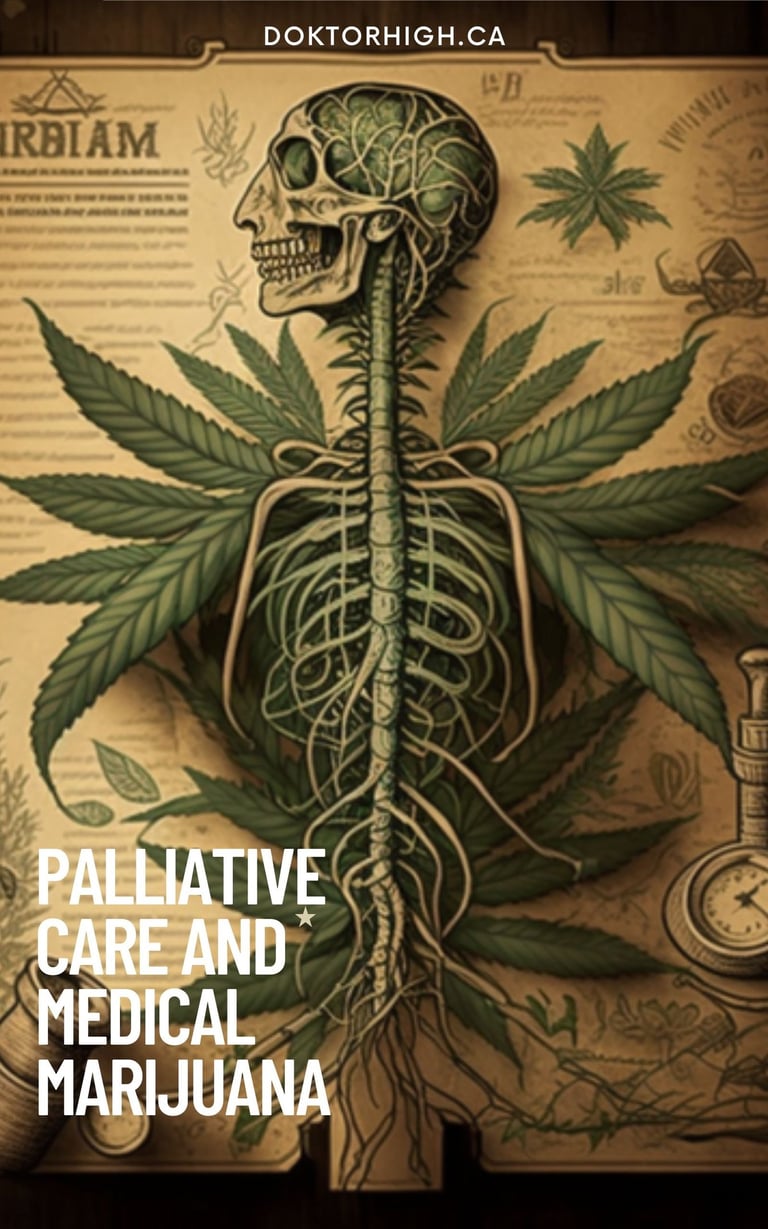

Palliative Care and Medical Marijuana
Palliative care focuses on improving the quality of life for individuals facing serious illnesses or conditions. It aims to alleviate symptoms, manage pain, and provide emotional support to patients and their families.
While traditional palliative care approaches involve various medications and supportive therapies, the potential benefits of medical cannabis therapy in this field have gained significant attention. This article explores the potential benefits of medical cannabis therapy for palliative care, supported by scientific evidence and relevant studies.
Understanding Palliative Care
Palliative care is a multidisciplinary approach that aims to enhance the quality of life for individuals with serious illnesses such as cancer, HIV/AIDS, neurodegenerative diseases, and end-stage organ failure. It focuses on symptom management, pain relief, emotional support, and addressing the psychosocial and spiritual needs of patients and their families.
Current Approaches in Palliative Care
Traditional palliative care approaches involve a combination of medications, such as opioids for pain management, antiemetics for nausea, and anxiolytics for anxiety. Additional interventions may include supportive therapies like counseling, physical therapy, and complementary therapies. However, these approaches may have limitations and potential side effects, leading to the exploration of alternative options like medical cannabis therapy.
The Potential Role of Medical Cannabis Therapy
Medical cannabis therapy, derived from the Cannabis sativa plant, contains various active compounds known as cannabinoids. The two most well-known cannabinoids are delta-9-tetrahydrocannabinol (THC) and cannabidiol (CBD). These cannabinoids interact with the body's endocannabinoid system, which plays a role in pain modulation, mood regulation, and the management of various symptoms associated with serious illnesses.
One of the primary potential benefits of medical cannabis therapy in palliative care is its ability to provide effective pain relief. Both THC and CBD have demonstrated analgesic properties and have shown promise in alleviating pain associated with cancer, neuropathic pain, and other chronic pain conditions. Medical cannabis therapy may offer an alternative or adjunct to traditional opioid-based pain management approaches, reducing the risk of opioid-related side effects and dependence.
Nausea and vomiting are common symptoms experienced by individuals undergoing palliative care, particularly those receiving chemotherapy or radiation treatment. Medical cannabis therapy, particularly THC, has shown antiemetic properties and may help alleviate treatment-induced nausea and vomiting, potentially improving the overall well-being of patients.
Maintaining adequate nutrition is crucial for individuals receiving palliative care, as weight loss and reduced appetite are common challenges. Medical cannabis therapy has been recognized for its ability to stimulate appetite, a phenomenon commonly referred to as the "munchies." THC, in particular, has shown promise in increasing appetite and supporting weight gain in patients with conditions like cancer and HIV/AIDS.
Serious illnesses often come with significant psychological distress, including anxiety, depression, and existential concerns. Medical cannabis therapy, particularly CBD-rich strains, has shown potential in reducing anxiety and promoting relaxation. It may provide relief from psychological symptoms, improve sleep quality, and enhance overall emotional well-being.
Sleep disturbances are common among individuals receiving palliative care, affecting both patients and their caregivers. Medical cannabis therapy has been reported to improve sleep quality and promote better sleep patterns. THC and CBD may help alleviate insomnia symptoms, reduce sleep disturbances, and enhance restorative sleep, leading to improved overall quality of life.
Safety and Considerations
When considering medical cannabis therapy for palliative care, it is crucial to consider potential side effects, individual responses, legal and regulatory considerations, and appropriate dosing. Common side effects of medical cannabis therapy include dry mouth, dizziness, changes in appetite, and temporary cognitive impairment. It is important to start with low doses, monitor for side effects, and consult with a healthcare professional experienced in medical cannabis therapy.
Legal and regulatory considerations regarding the use of medical cannabis therapy should be taken into account. Availability, access, and specific regulations may vary depending on the jurisdiction. It is essential to be aware of local laws and regulations surrounding medical cannabis therapy.
The potential benefits of medical cannabis therapy in palliative care are promising. Its potential for effective pain management, nausea and vomiting control, appetite stimulation, anxiety reduction, and sleep improvement can significantly enhance the quality of life for individuals facing serious illnesses. Medical cannabis therapy may offer an alternative or adjunctive approach to traditional palliative care interventions, providing patients with more comprehensive and personalized symptom management.
As research in this field continues to expand, a deeper understanding of the specific mechanisms of action, optimal dosing, and long-term outcomes of medical cannabis therapy in palliative care can be gained. This knowledge can contribute to improved guidelines and protocols, ensuring safe and effective use of medical cannabis therapy for individuals receiving palliative care.
References:
Fallon MT, et al. The therapeutic potential of cannabinoids in palliative medicine. Support Care Cancer. 2005;13(11):831-834.
Johnson JR, et al. Multicenter, double-blind, randomized, placebo-controlled, parallel-group study of the efficacy, safety, and tolerability of THC:CBD extract and THC extract in patients with intractable cancer-related pain. J Pain Symptom Manage. 2010;39(2):167-179.
Ahmedzai S, et al. Cannabinoids for control of chemotherapy induced nausea and vomiting: Quantitative systematic review. BMJ. 2001;323(7303):16-21.
Rocha FC, et al. Therapeutic use of Cannabis sativa on chemotherapy-induced nausea and vomiting among cancer patients: Systematic review and meta-analysis. Eur J Cancer Care (Engl). 2008;17(5):431-443.
